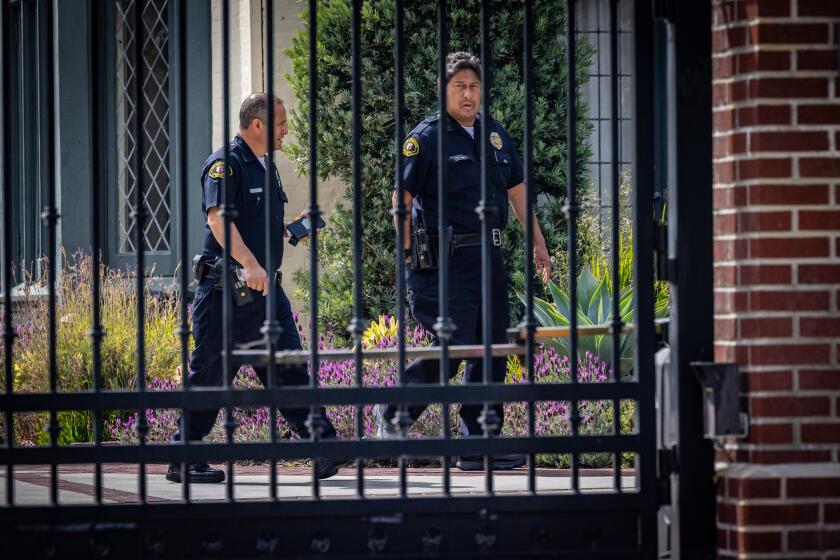San Diego schools reach settlement in anti-Islamophobia initiative lawsuit
The San Diego Unified School District reached a settlement last week with five families who challenged the district’s “Anti-Islamophobia Initiative” in court, claiming it gave special treatment to Muslim students.
The lawsuit, filed in 2017 in U.S. District Court for the Southern District of California, challenged the constitutionality of the district’s anti-bullying efforts to protect Muslim students and to increase lessons about Islam, among other things.
The settlement did not involve monetary payments, and the district did not admit liability.
But San Diego Unified agreed to distribute a policy memo to its area superintendents and principals discussing “limits on the conduct of public school officials as it relates to religious activity.”
District General Counsel Andra Greene said this memo summarized already existing policies and regulations and incorporated guidance from a state-adopted framework for world history curriculum.
The memo provides clarity to district staff about issues of religion in an educational setting, she said.
For instance, the memo discusses treating each religion with equal respect and affirms that education materials must be neutral about religion.
“It is and always has been the district’s policy and practice to ensure that children of all faiths, ethnicities and genders are able to learn and thrive in a safe and non-discriminatory manner,” Greene said in an email Tuesday. “When we sat down and had an honest discussion, it became apparent that was the goal of all parties in this case and there was no real dispute.”
The district, which is the second largest in the state, representing more than 125,000 students, developed the initiative in 2016 in an effort to address anti-Muslim bullying.
It was prompted by a 2015 report that said 55% of American Muslim students surveyed in California said they were bullied because of their religion. The Council on American-Islamic Relations, or CAIR, publicized the survey.
The school board voted a year later to make a policy to protect Muslim students from bullying and increase education about Islam. The plan was to work in partnership with CAIR.
Students already learn about Islam and other religions as part of a social studies curriculum set by the state. At the time, district officials said additional lessons could be added to create a better understanding of the religion.
Anti-bullying policies at San Diego Unified are already in place for other student groups, including LGBT students and students who are Native American and Latino.
But six parents and two organizations — Citizens for Quality Education San Diego and San Diego Asian Americans for Equality Foundation — sued the district in federal court. The Freedom of Conscience Defense Fund (FCDF), based in Rancho Santa Fe, represented them for free.
“Nowhere is religious liberty and equal protection more critical than in our schools,” said Charles LiMandri, FCDF’s chief counsel, in a statement. “We commend the district for taking affirmative steps to ensure that students of all faiths may learn and thrive in a safe and nondiscriminatory environment.”
The suit’s original complaint alleged, among other things, that the district’s anti-Islamophobia policy violated the U.S. Constitution because it singled out and favored Muslim students.
It also questioned whether “a Muslim bullying crisis even existed,” and it claimed that the district’s proposed partnership with CAIR gave that group governmental power, constituting an entanglement between government and religion.
San Diego Unified backed off from its partnership with CAIR in response to the suit and instead partnered with the Anti-Defamation League, a nonprofit organization that fights bigotry and anti-Semitism, to create a broader anti-bullying program that included anti-Islamophobia efforts.
The families had sought a preliminary injunction to shut down the district’s efforts but, in September, U.S. District Judge Cynthia Bashant rejected it, saying the families could not prove the district’s program was unconstitutional nor that it favored Islam over other religions.
“There is no evidence to support [the] plaintiffs’ suggestion that the district has failed to provide instructional materials for other religions and religious groups,” Bashant wrote in her 54-page ruling, which did not close the case. “In fact, the district indicates that its instructional materials ‘address all major world religions.’ ”
Bashant added that the district’s efforts to combat bullying would benefit all students, not just those who practice Islam.
“Based on plaintiffs’ own definitions, the initiative’s focus is not religion, but on conduct and behavior,” Bashant said. “The evil that measures like the [district’s] initiative seek to address can harm more than those who are directly targeted.”
Both parties agreed to cover their own attorneys’ fees in the settlement and filed a joint motion to dismiss the case. The court granted the motion on March 20.
More to Read
Start your day right
Sign up for Essential California for news, features and recommendations from the L.A. Times and beyond in your inbox six days a week.
You may occasionally receive promotional content from the Los Angeles Times.







